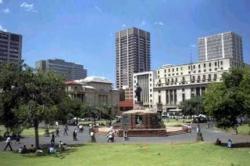Cyber Debate On Upcoming Cuban Elections in South Africa
- Submitted by: admin
- Africa
- Caribbean
- Events
- International
- Personalities
- Politics and Government
- 01 / 18 / 2008

An online debate entitled "Cuba: Democracy and Elections" is planned for late Thursday afternoon, as part of preparations ahead of elections there on Sunday.
Cuban Ambassador to South Africa Esther Armenteros said the participants would have an opportunity to ask questions to a panel of experts, while also exchanging views on the Cuban elections.
The list of the candidate MPs reflects a multi-generational group of people, which reveals a unique aspect of Cuban politics.
"The large numbers of new parliament members proposed for the next five - year legislative period, stems from the fact that in Cuba, becoming a lawmaker at any level, does not mean you need to be a professional politician," Ms Armenteros told reporters in Pretoria, Thursday.
She said it was hard to find a situation in other countries, where such a large number of citizens holding posts as city councilors or mayors, had the opportunity to also be national legislature members - without incurring the cost of an election campaign.
Ms Armenteros said 285 candidates were first elected at local elections in their voting districts, putting them in line to possibly serve as MPs.
A test run of Cuba's voting system took place successfully last Sunday, as the vast majority of voting boundaries were already set for 20 January 2007 balloting to elect members of the provincial assembly and national parliament.
Ms Armenteros said in terms of continuity and renewal, 224 candidates were currently in office in the current 609 member legislature.
She said a little over 385 legislators would be newcomers in the new legislature of 614 members with the additional five members reflecting the population growth.
With regards to educated population, the ambassador said 42 percent of the 285 candidates were women and the majority of candidates [of 481] had a university level education while 127 had high school qualification and technical degrees.
"These candidates have the virtue of expressing the diversity among Cubans," she said.
In October last year, Cubans elected their representatives to community governments.
The nearly 8.3 million Cubans with the right to vote chose by ballot 15 236 local candidates from a list of 37 258.
Over 37 700 polling sites were fitted out, with the support of several thousands of volunteers and primary and high school students, thus making the Cuban elections one of the cheapest worldwide.
The electoral process was free from political propaganda, given that candidates were chosen by a show of hands in neighborhood meetings in which the party did not take place.
The local elections [in October last year] followed just after South Africa and Cuba signed a co-operation agreement that would benefit many unemployed young people, by training them in the field of social development.
(BuaNews)
Cuban Ambassador to South Africa Esther Armenteros said the participants would have an opportunity to ask questions to a panel of experts, while also exchanging views on the Cuban elections.
The list of the candidate MPs reflects a multi-generational group of people, which reveals a unique aspect of Cuban politics.
"The large numbers of new parliament members proposed for the next five - year legislative period, stems from the fact that in Cuba, becoming a lawmaker at any level, does not mean you need to be a professional politician," Ms Armenteros told reporters in Pretoria, Thursday.
She said it was hard to find a situation in other countries, where such a large number of citizens holding posts as city councilors or mayors, had the opportunity to also be national legislature members - without incurring the cost of an election campaign.
Ms Armenteros said 285 candidates were first elected at local elections in their voting districts, putting them in line to possibly serve as MPs.
A test run of Cuba's voting system took place successfully last Sunday, as the vast majority of voting boundaries were already set for 20 January 2007 balloting to elect members of the provincial assembly and national parliament.
Ms Armenteros said in terms of continuity and renewal, 224 candidates were currently in office in the current 609 member legislature.
She said a little over 385 legislators would be newcomers in the new legislature of 614 members with the additional five members reflecting the population growth.
With regards to educated population, the ambassador said 42 percent of the 285 candidates were women and the majority of candidates [of 481] had a university level education while 127 had high school qualification and technical degrees.
"These candidates have the virtue of expressing the diversity among Cubans," she said.
In October last year, Cubans elected their representatives to community governments.
The nearly 8.3 million Cubans with the right to vote chose by ballot 15 236 local candidates from a list of 37 258.
Over 37 700 polling sites were fitted out, with the support of several thousands of volunteers and primary and high school students, thus making the Cuban elections one of the cheapest worldwide.
The electoral process was free from political propaganda, given that candidates were chosen by a show of hands in neighborhood meetings in which the party did not take place.
The local elections [in October last year] followed just after South Africa and Cuba signed a co-operation agreement that would benefit many unemployed young people, by training them in the field of social development.
(BuaNews)
Comments